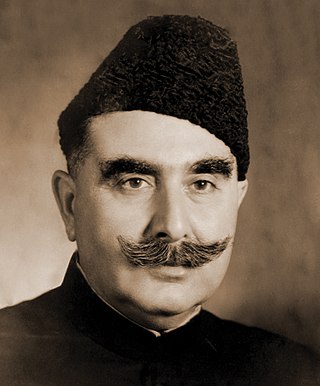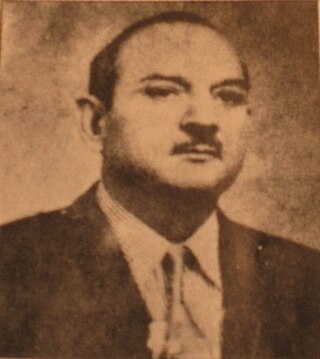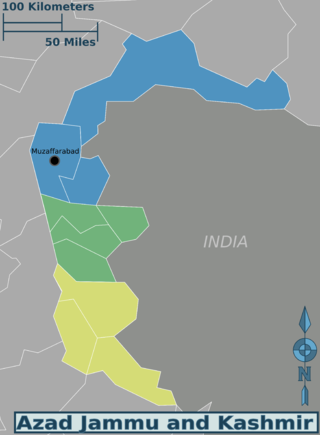
Liaquat Ali Khan was a Pakistani lawyer, politician and statesman who served as the first prime minister of Pakistan from 1947 until his assassination in 1951. He was one of the leading figures of the Pakistan Movement and is revered as Quaid-e-Millat.

Sir Khawaja Nazimuddin was a Pakistani politician and statesman who served as the second governor-general of Pakistan from 1948 to 1951, and later as the second prime minister of Pakistan from 1951 to 1953.

Sir Malik Ghulam Muhammad was a Pakistani politician and economist who served as the third governor-general of Pakistan from 1951 to 1955.

Chaudhry Muhammad Ali was a Pakistani politician and statesman who served as the fourth prime minister of Pakistan from 1955 until his resignation in 1956. His government transitioned Pakistan from a British Dominion to an Islamic Republic.

Ibrahim Ismail Chundrigar was a Pakistani politician who served as the sixth prime minister of Pakistan, appointed in this capacity on 17 October 1957. He resigned due to a vote of no confidence on 11 December 1957, against him.

The Rawalpindi conspiracy was an attempted coup to overthrow Liaquat Ali Khan, the first prime minister of Pakistan, in March 1951. It was the first of many subsequent coup attempts against governments in the history of Pakistan. The coup was notably planned by military general Akbar Khan, poet Faiz Ahmad Faiz and writer Sajjad Zaheer along with 12 others.

Sardar Abdur Rab Nishtar was a Pakistani independence activist and politician from the North-West Frontier Province. He served as the first Minister of Communications of Pakistan from August 1947 to August 1949 and then as the second Governor of West Punjab from August 1949 to November 1951.

The Pakistani Republican Party was formed in October 1955, by a break away faction of the Muslim League and other politicians supporting the creation of the West Pakistan province, on the instigation of key leaders in the military and civil service. The President of the party was Dr Khan Sahib, Chief Minister of West Pakistan. The main instigator behind this development was Iskander Mirza, the then Governor General of Pakistan. He was the vice president of this party and later became the inaugural President of Pakistan in 1956. The Central Parliamentary Leader was Sir Feroz Khan Noon, Prime Minister of Pakistan .

Mazar-e-Quaid, also known as Jinnah Mausoleum or the National Mausoleum, is the final resting place of Muhammad Ali Jinnah, the founder of Pakistan. Designed in a 1960s modernist style, it was completed in 1971, and is an iconic symbol of Karachi as well as one of the most popular tourist sites in the city. The mausoleum complex also contains the tomb of Jinnah's sister, Māder-e Millat Fatima Jinnah, as well as those of Liaquat Ali Khan and Nurul Amin, the first and eighth Prime Ministers of Pakistan respectively. The tomb of Sardar Abdur Rab Nishtar, a stalwart of the Muslim League from Peshawar, is also located there.
Nawab Sir Muzaffar Ali Khan Qizilbash was born in 1908. He was a Pakistani politician from the Punjab and a minister in the governments of the Punjab, West Pakistan and Pakistan. Muzaffar Qizilbash started his legislative career as a Unionist, later joining the Muslim League and subsequently the Republican Party. He later served as Minister for Industries in the cabinet of Prime Minister Ibrahim Ismail Chundrigar from October 18, 1957 - December 16, 1957. Afterwards, he served as Minister for Industries, Commerce and Parliamentary Affairs in the cabinet of Prime Minister Feroz Khan Noon (Republican) from December 16, 1957 - March 18, 1958, when he was appointed Chief Minister of West Pakistan.

Nawab Mohammad Ismail Khan was an eminent Muslim politician and a leading activist of the All-India Muslim League, who stood in the forefront of the Khilafat Movement and Pakistan Movement. Nawab Mohammad Ismail Khan is regarded as one of the founding fathers of the Islamic Republic of Pakistan due to the roles that he fulfilled for the cause of it. His position was described as only second to that of Muhammad Ali Jinnah.
Events from the year 1947 in Pakistan.
Events from the year 1951 in Pakistan.

Naseer Ahmad Malhi was a Pakistani politician, known for playing a pivotal role in the formation of the Islamic Republic of Pakistan. Malhi is recognised as one of the nation's activists of the Pakistan Movement.
Rahil Begum Sherwani was the founder of the All India Women's Muslim League. The AIWML was the women's wing of the All India Muslim League. It was inaugurated by Muhammad Ali Jinnah in Aligarh in 1938. She was the younger sister of the famous Indian scholar Haroon Khan Sherwani and the daughter of Haji Musa Khan Sherwani.
Raja Ghazanfar Ali Khan Khokhar was an Indian politician and monarch. He was born in Pind Dadan Khan, a town in Jhelum district, British India. He was a leading member of the All India Muslim League and a trusted lieutenant of Muhammad Ali Jinnah, serving in the Interim Government of India of 1946 as a member of the Central Legislative Assembly of India.

The Muslim League was the original successor of the All-India Muslim League that led the Pakistan Movement to achieve an independent nation. Five of the country's Prime Ministers have been affiliated with this party, namely Liaquat Ali Khan, Khwaja Nazimuddin, M. A. Bogra, Chaudhry Muhammad Ali, and I. I. Chundrigar. The Muslim League was defeated in the 1955 elections to the Constituent Assembly by a political alliance known as the United Front. However, Prime Minister C. M. Ali and Prime Minister Chundrigar were appointed to lead a minority government. The party was dissolved in 1958 after the declaration of Martial Law by General Muhammad Ayub Khan, the Commander-in-Chief of Pakistan Army.

General elections were held in British India in December 1945 to elect members of the Central Legislative Assembly and the Council of State. The Indian National Congress emerged as the largest party, winning 57 of the 102 elected seats. The Muslim League won all Muslim constituencies, but failed to win any other seats. Of the 13 remaining seats, 8 went to Europeans, 3 to independents, and 2 to Akali candidates in the Sikh constituencies of Punjab. This election coupled with the provincial one in 1946 proved to be a strategic victory for Jinnah and the partitionists. Even though Congress won, the League had united the Muslim vote and as such it gained the negotiating power to seek a separate Muslim homeland as it became clear that a united India would prove highly unstable. The elected members later formed the Constituent Assembly of India.

In spring 1947, an uprising against the Maharaja Hari Singh of Jammu and Kashmir broke out in the Poonch jagir, an area bordering the Rawalpindi district of West Punjab and the Hazara district of the North-West Frontier Province in the future Pakistan. It was driven by grievances such as high taxes, the Maharaja's neglect of World War veterans, and above all, Muslim nationalism with a desire to join Pakistan. The leader of the rebellion, Sardar Muhammad Ibrahim Khan, escaped to Lahore by the end of August 1947 and persuaded the Pakistani authorities to back the rebellion. In addition to the backing, Prime Minister Liaquat Ali Khan authorised an invasion of the state, by the ex-Indian National Army personnel in the south and a force led by Major Khurshid Anwar in the north. These invasions eventually led to the First Kashmir War fought between India and Pakistan, and the formation of Azad Kashmir provisional government. The Poonch jagir has since been divided across Azad Kashmir, administered by Pakistan and the state of Jammu and Kashmir, administered by India.














